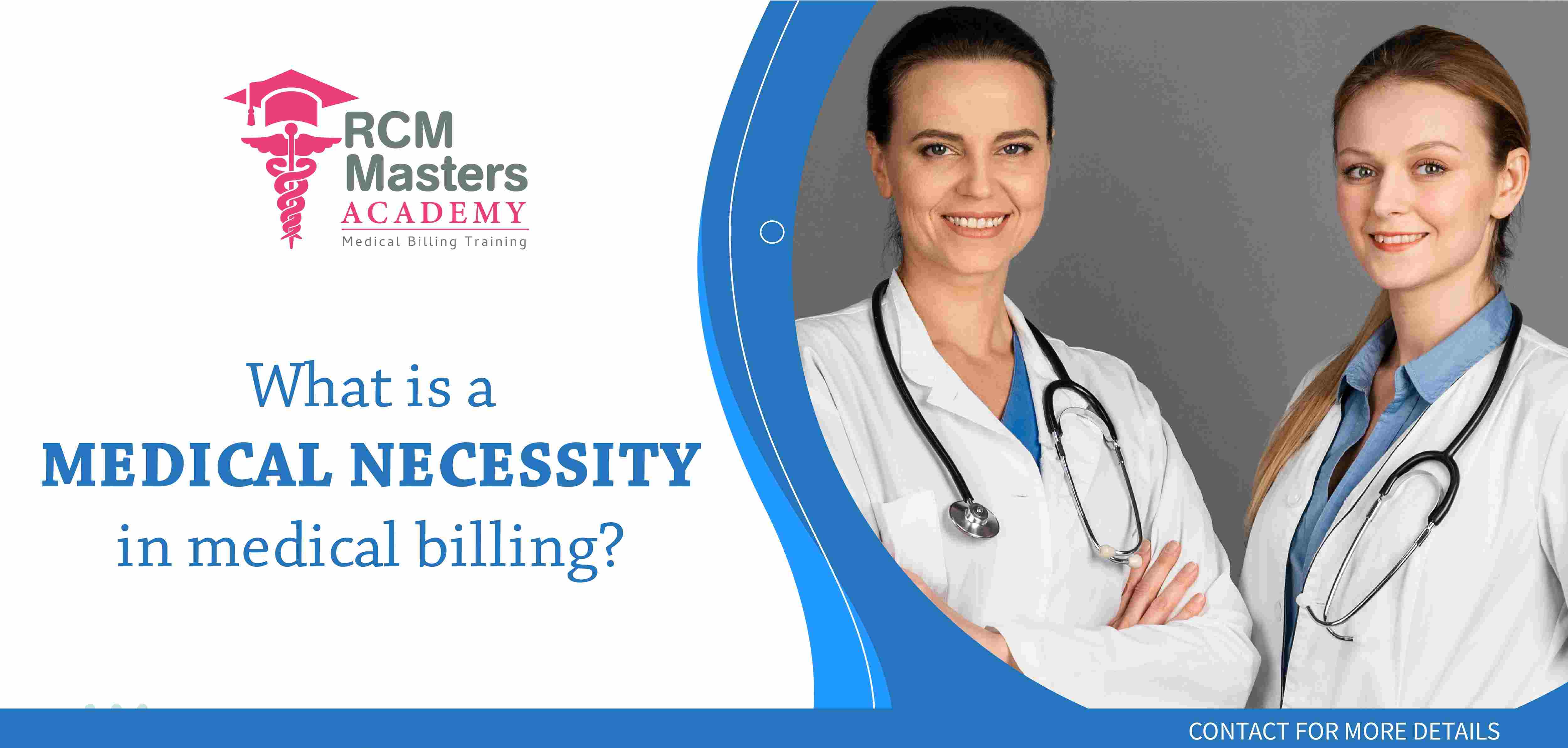 info@rcmmastersacademy.com
info@rcmmastersacademy.com

Medical necessity is a term used in medical billing to describe the requirement that a healthcare service or procedure must be deemed necessary for the treatment of a patient’s medical condition. It is a crucial aspect of medical billing because it ensures that medical services and procedures are justified and approved by insurance companies or government programs.
When a patient seeks medical treatment, the healthcare provider must determine the medical necessity of the services or procedures that will be provided. The healthcare provider must evaluate the patient’s medical condition and make a determination on the appropriate course of treatment. If a healthcare service or procedure is deemed medically necessary, it means that it is necessary to diagnose or treat the patient’s medical condition, and is therefore covered by insurance.
Medical necessity is determined by a number of factors, including the patient’s medical history, symptoms, and diagnosis. Medical providers may also refer to clinical guidelines and best practices to determine whether a particular service or procedure is medically necessary.
Insurance companies and government programs, such as Medicare and Medicaid, have specific guidelines for determining medical necessity. These guidelines are used to determine which services and procedures will be covered by insurance or government programs. Healthcare providers must follow these guidelines to ensure that the services they provide are medically necessary and will be covered by insurance or government programs.
If a healthcare service or procedure is not deemed medically necessary, it may not be covered by insurance or government programs. In this case, the patient may be responsible for paying for the service or procedure out-of-pocket.
It is important to note that just because a service or procedure is deemed medically necessary does not mean that it is the only course of treatment available. Patients have the right to choose their course of treatment, and healthcare providers should present all available treatment options to the patient.
Medical necessity also plays a role in preventing fraud and abuse in the healthcare system. Providers who submit claims for services that are not medically necessary may be committing healthcare fraud. Insurance companies and government programs have programs in place to detect and prevent fraud, including reviewing claims for medical necessity.
In conclusion, medical necessity is an important concept in medical billing. It ensures that healthcare services and procedures are justified and approved by insurance companies or government programs. Healthcare providers must evaluate the patient’s medical condition and make a determination on the appropriate course of treatment based on clinical guidelines and best practices. By following these guidelines, healthcare providers can ensure that their services are medically necessary and will be covered by insurance or government programs.
You can enroll for our Online Medical Billing Training here:

Medical billing can be a complex and often confusing process, especially when it comes to understanding what qualifies as a "medical necessity." In essence, medical necessity refers to the requirement that a medical procedure or service be considered essential for a patient's diagnosis or treatment.
At its core, medical necessity is about ensuring that healthcare resources are used appropriately and efficiently, without sacrificing the quality of care for patients. By establishing clear guidelines for what qualifies as medically necessary, healthcare providers and insurance companies can work together to deliver the right care to the right patients at the right time.
So what exactly qualifies as a medical necessity? In general, medical necessity is determined based on several factors, including the patient's diagnosis, their symptoms, and the expected outcome of the treatment. It is important to note that medical necessity is not a one-size-fits-all concept and can vary depending on the individual patient's needs.
Some common examples of medical procedures or services that are considered medically necessary include:
1. Diagnostic testing: This may include things like blood tests, X-rays, MRIs, or other imaging studies that are needed to diagnose or rule out a medical condition.
2. Surgery: In some cases, surgery may be the most appropriate treatment option for a patient's condition.
3. Prescription medications: Medications may be prescribed to treat a variety of conditions, ranging from chronic illnesses to acute infections.
4. Physical therapy: For patients recovering from an injury or surgery, physical therapy may be necessary to regain strength and mobility.
5. Mental health services: This may include counseling, therapy, or medication to treat conditions like depression, anxiety, or PTSD.
It is important to note that not all medical procedures or services are considered medically necessary. For example, cosmetic procedures, such as Botox injections for wrinkles or liposuction for weight loss, are typically not considered medically necessary.
In order for a medical procedure or service to be considered medically necessary, it must meet certain criteria. These criteria may vary depending on the patient's insurance plan, but generally include:
1. The procedure or service is consistent with the patient's diagnosis and symptoms.
2. The procedure or service is expected to improve the patient's health or prevent a decline in their condition.
3. The procedure or service is the most appropriate and cost-effective option for the patient's condition.
4. The procedure or service is not experimental or investigational.
5. The procedure or service is not being performed primarily for the convenience of the patient or healthcare provider.
Ultimately, determining medical necessity is a complex process that involves careful consideration of the patient's individual needs and medical history. By working together, healthcare providers and insurance companies can ensure that patients receive the care they need, while also maximizing the efficient use of healthcare resources.
You can enroll for our Online Medical Billing Training here: